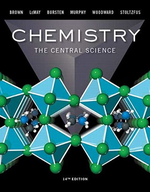?Consider the following acid-neutralization reactions involving the strong base
Chapter 5, Problem 5.122(choose chapter or problem)
Consider the following acid-neutralization reactions involving the strong base NaOH(aq):
\(\mathrm{HNO}_{3}(a q)+\mathrm{NaOH}(a q) \longrightarrow \mathrm{NaNO}_{3}(a q)+\mathrm{H}_{2} \mathrm{O}(l)\)
\(\mathrm{HCl}(a q)+\mathrm{NaOH}(a q) \longrightarrow \mathrm{NaCl}(a q)+\mathrm{H}_{2} \mathrm{O}(l)\)
\(\mathrm{NH}_{4}^{+}(a q)+\mathrm{NaOH}(a q) \longrightarrow \mathrm{NH}_{3}(a q)+\mathrm{Na}^{+}(a q)+\mathrm{H}_{2} \mathrm{O}(l)\)
(a) By using data in Appendix C, calculate ΔH° for each of the reactions.
(b) As we saw in Section 4.3, nitric acid and hydrochloric acid are strong acids. Write net ionic equations for the neutralization of these acids.
(c) Compare the values of ΔH° for the first two reactions. What can you conclude?
(d) In the third equation NH4+1aq2 is acting as an acid. Based on the value of ΔH° for this reaction, do you think it is a strong or a weak acid? Explain.
Text Transcription:
HNO_3(aq)+NaOH(aq) longrightarrow NaNO_3(aq)+H_2O(l)
HCl(aq)+NaOH(aq) longrightarrow NaCl(aq)+H_2O(l)
NH_4^+(aq)+NaOH(aq) longrightarrow NH_3(aq)+Na^+(aq)+H_2O(l)
Unfortunately, we don't have that question answered yet. But you can get it answered in just 5 hours by Logging in or Becoming a subscriber.
Becoming a subscriber
Or look for another answer
